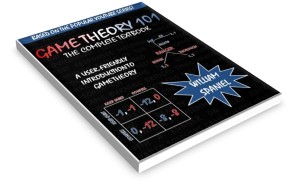Now that we have studied games of complete information and games of incomplete information, we can start asking basic comparison questions. This time, we investigate whether having more information always benefits a player.
Takeaway Points
- In a decision theoretic context—that is, when there are not other strategic players around—more information is always better. The intuition for this is straightforward. If information would be unhelpful, then the person can just ignored it. See: Blackwell, “Equivalent Comparisons of Experiments”.
- This result does not extend to game theoretic contexts. Having strategic opponents can mean that a player prefers living in a world where he is less informed than in a world where he is better informed.
- The problem that arises is that ignorance can make choosing some cooperative strategies credible. If the player has private information, those cooperative strategies can become incredible. The other player responds by choosing a conflictual strategy, leaving the original player in a worse position than before.

